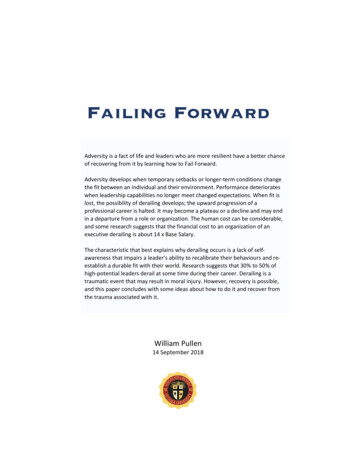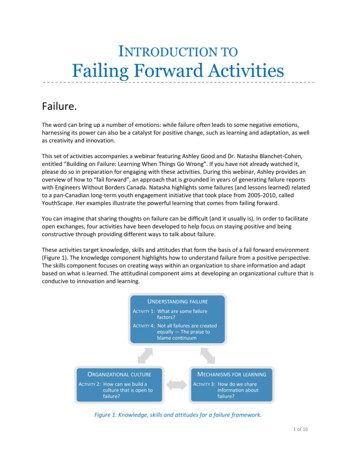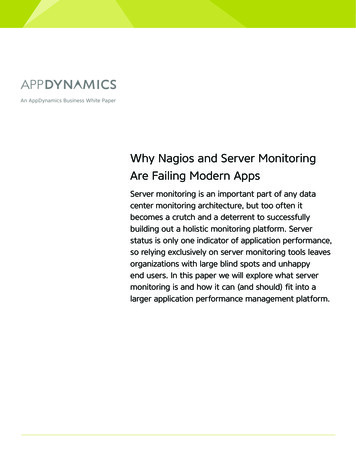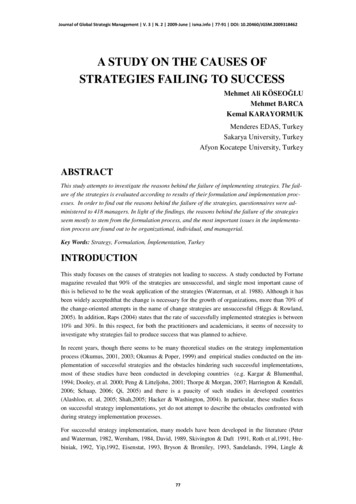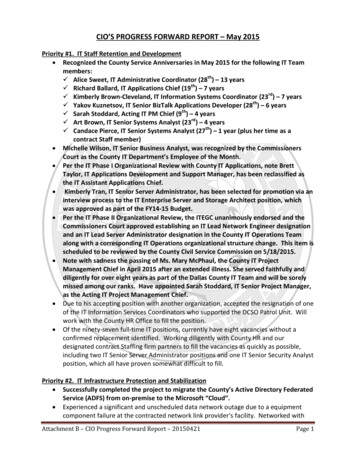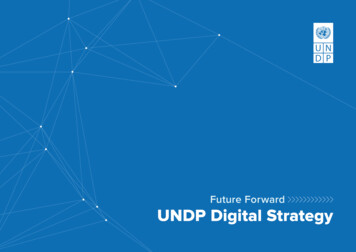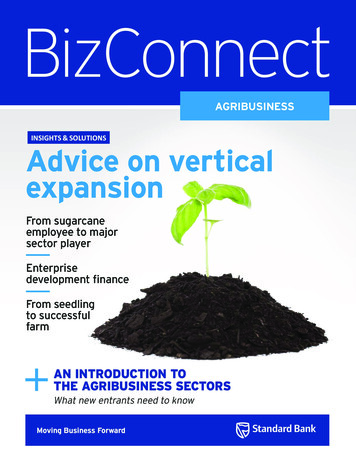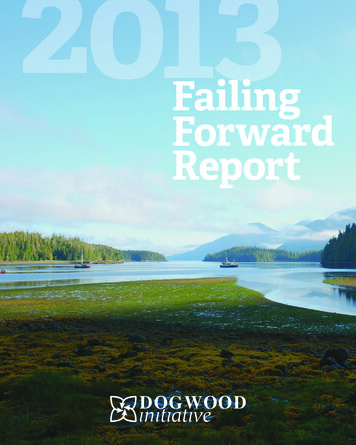
Transcription
2013FailingForwardReport
“Failure is not onlyan option, but a keyfactor in innovation andgrowth. Let’s not forget,embracing mistakes hasbrought us everythingfrom penicillin to post-itnotes!” – Laurie AndersonLiam Kearney via Flickr
Contents2013 Failures ReportIntroduction 4Embracing Failure 5Failures in 2013Organizing on Northern Vancouver Island 6No Tankers in the 2013 provincial election 8Shifting culture toward engagement organizing 11Outreach to potentially allied organizations for whatwould become the Let BC Vote campaign 13Failures in 2012Communications failures with supporters 15Not putting enough pressure on political partiesregarding Kinder Morgan’s tanker and pipeline proposal 16Project Management: underestimating the time andresources necessary to launch new projects 17DesignJessica Weber Star Graphic DesignPhotographyLiam Kearney (flickr.com/photos/lkearney)
By Will Horter, Executive DirectorFailing ForwardThe status quo isn’t acceptable to me. Whetherit is inexcusable poverty, degradation of the air, landand water on which we rely, injustice or oppression,I worry about the growing gap between the world Idream about for my precious daughter and the worldI see unfolding before me. As a father, as an activistand as a human being, I spend a lot of time trying toidentify tangible paths to reverse these trends andmove closer to the world of my aspirations.To the best of my ability, I’m trying to deeplyembed a culture of failing fast and of failing forwardwithin everything Dogwood Initiative does. I knowDogwood will continue to make mistakes. If we don’t,it means we aren’t trying hard enough. To tackle thebiggest, hairiest, most audacious issues, civil societymust learn to move through the test-fail-succeedcycles of innovation much faster and more transparently than our current approach permits.The path forward is windy and while the specific steps needed may vary with place and circumstance, one thing has become clear to me: changingthe world just isn’t possible without taking risksand innovating – which inevitably means failingsometimes.The 2013 Failing Forward Report is DogwoodInitiative’s latest contribution to fast-tracking thisprocess.4
Embracing FailureEmbracing failure as an organization goes way beyond writing anannual failure report. It involves shifting organizational culture andbeing open to a dialogue – both internally and externally.When Dogwood Initiative began this process acouple years ago, I’d hoped that publicly disclosingour biggest failures would help open us up to learning – and to testing our assumptions – while alwaysseeking the quickest, cheapest, most effective meansto creating systemic change on important issuesaffecting British Columbians.What we found was that it was easier said thandone. But that commitment to the process, howeverdifficult, resulted in surprising benefits.The process of moving from concept to innovation is simple. It involves piloting an idea, measuringthe results, figuring out what worked and what failed,adapting and redeploying. To scale bigger – wash,rinse and repeat.Our main goal was to embed the process ofinnovation – failing fast and learning from it – in thecultural DNA of Dogwood Initiative. We also had twoexternal goals. We hoped to:1. Catalyze more frank discussion of failure betweenNGOs and amongst funders.2. Build transparency and trust with our supporters.With the later goals we had mixed results. Somefoundations embraced the dialogue we’d hoped for.We were asked by two foundations to present ourfailures report to their boards and other grantees.Also, Failing Forward 2011-12 seemed to catalyze adeeper dialogue with many program officers whowork with us. That said, I was disappointed therewasn’t more uptake in the NGO sector.Although our data is limited, we believe themore systematic confession of Dogwood Initiative’sbiggest failures did contribute to our strengthenedconnection with supporters. One of the strongestthemes that surfaced in our survey of 3,500 supporterswas a desire for timely, frank reporting onDogwood’s successes and failures. In addition to ourannual failure report, report-back e-mails that outline successes, failures, progress and next steps arenow compulsory and are integrated into communications schedules for all fundraising series and callsto action. So far, supporter responses to this kind ofaccountability have been consistently positive.I am also pleased to report there was no backlash from last year’s report. I’m not ashamed toadmit that I was anxious last year about publicizingour failures – especially considering the increasinglydivisive political culture in Canada today. Fortunately, anxiety that our admissions would be usedagainst us proved unfounded.“We are all failures – at least thebest of us are.” - J.M. Barrie5
Failures in 2013Failure 1: Organizing on Northern VancouverIslandGoal: To build a politically powerful ground game that keydecision-makers perceived as formidableOur failure:Dogwood Initiative attracted more than32,000 new supporters after Canada’s then NaturalResources Minister Joe Oliver attacked everydayCanadians as “radicals”. This huge spike in supportexposed the limitations of our systems and highlighted our inability to integrate supporters intoan effective political force. We realized DogwoodInitiative needed to build both a larger networkof supporters that covered the province, as wellas a deeper network grounded in neighborhoodsthat could provide political muscle targeted at keydecision-makers.After hours of analysis of past election results,the density of our existing supporters and theimportance of federal and provincial incumbents toleaders in Ottawa and Victoria, we chose to launchour organizing model pilot on northern VancouverIsland. We set some initial acquisition targets, rentedout an office in Courtenay and hired an experiencedcanvasser from Victoria as the lead organizer. Whatwe didn’t do was set clear metrics, provide muchtraining, direction or, frankly, organizational support.6As a result, this pilot didn’t produce the resultswe’d hoped for. We should have paid more attentionwhen our initial acquisition numbers were modest,but we weren’t paying close enough attention, norproviding the pilot the support it needed. The problem only came to a head during the 2013 provincialelection when we found out that the team of volunteers wasn’t willing to door knock or conduct phonebanks. Ultimately, despite everyone’s best intentionsand hard work, we didn’t build the strong, cohesiveteam of volunteers needed to organize at scale onthe local level.Our debrief following the 2013 provincial election made it clear that change was needed. It tookus a few months to identify the need to start over onthe ground floor with a greater focus on volunteertraining and staff support.What we learned:Even though the pilot didn’t produce the resultswe hoped for, the lessons learned were invaluablein designing our new, citizen-fueled, riding-by-ridingorganizing efforts that we launched in January 2014.
The central lesson of this pilot is that organizingis about meaningful relationships. We learned thatchoosing the right organizer for the specific place isthe make-it-or-break-it decision. In addition to getting the right person in the right place, other lessonsthis pilot highlighted include: The best organizers are grounded in local culture and community; The task was too big for one person and canonly be accomplished by a team, so the keyaptitude of a good organizer is their ability torecruit, inspire and support a team;effectively manage between six and ten relationshipsat a time.With this lesson we have adopted a “snowflake model”, or a distributed leadership structure,adapted from the organizing models of MarshallGanz. Key features of this approach include cleanlines of communication within and between eachteam, all team members are accountable to eachother, and that the power, responsibility and ownership of the tasks and outcomes are distributed – notconcentrated. To truly engage local citizens, Dogwood Initiative needed to change the way it structures,staffs and manages its campaigns; Clear goals and objectives for teams must beestablished early; and Accountability and open communicationschannels must be established to provide bothautonomy and structure for organizers and theirteams.As with all pilots, we set out to conduct “a smallscale preliminary study to evaluate feasibility, time,cost, adverse events, and affect size in an attempt topredict an appropriate sample size and improve uponthe study design prior to performance of a full-scaleresearch project.” (Wikipedia)Even though the pilot didn’t achieve our internalgoals, we learned valuable lessons that have helpedDogwood understand how to better organize at theregional scale.Going forward, what has changed?The pilot confirmed what our previous organizingefforts, and new science on human behavior, taughtus: humans, no matter how talented, can onlyThe strength of our new distributed organizingmodel is that it integrates local action with the bigger, broader purpose: it’s scalable, yet manageableon a human scale. It builds on the glue that drives allsuccessful relationships.Every team has a leader who coaches organizersthrough challenges and helps keep the big picturein sight without being responsible for everything. Tomaximize effectiveness, teams are small: each member has a clear area of responsibility and is able tomeasure their progress. Teams meet regularly and,most importantly, they have fun together.7
Failure 2: No Tankers in the 2013 provincialelectionGoal: To ensure the next government of British Columbia opposedprojects that would expand oil tanker traffic in B.C. watersOur failure:There are endless interpretations of what exactlyhappened during the election. It’s difficult to talkabout the nuances of what worked and, more importantly, what didn’t.First, the positives: we succeeded in helpingmake the expansion of oil tanker traffic a definingissue of the 2013 election. The leaders of threeparties – the Green, NDP and Liberal – competed tobe perceived as No Tankers champions. The LiberalParty even made the peculiar anti-NDP move of running “Stand Up for BC” ads, which were perceived aspraising the Green Party position on oil tankers andpipelines.During the entire election the rhetoric fromGreen, NDP and Liberal leaders was critical ofEnbridge’s proposal – but the big question was wherethe next government of B.C. would stand on KinderMorgan. Going into the election only the Green Partyhad come out against Kinder Morgan – the NDP position was “wait and see” while the Liberals promotedtheir five conditions.Dogwood’s non-partisan canvassers wereworking on the ground door-knocking in potentialswing ridings, informing their neighbors about thevarious party positions. Our team in the riding of OakBay-Gordon Head received national media attention,as it was perceived as a battleground between theNDP and Greens. Even though they received morepublicity, our Oak Bay team was doing nothing8different than any of the other 13 teams operating inother ridings.Three weeks before the vote, frontrunner AdrianDix of the BC NDP announced his opposition to theKinder Morgan proposal, which caught even members of his own party by surprise. At a press conference in Kamloops, Dix declared that the expectedincrease in tanker traffic resulting from KinderMorgan’s plan was not acceptable, later adding hewould not support any oil pipeline that would changeVancouver’s harbour into a major oil export terminal.There has been a lot of speculation about whyAdrian Dix chose to do this at that moment in thecampaign. The truth is no one except Mr. Dix willever really know.People offer various speculative hypotheses forDix’s surprise announcement, arguing the NDP wastrying to:1. Prevent a Green Party breakthrough in Oak Bay;2. Prevent a bitter split in the NDP caucus; or3. Appease Dogwood and our growing supporterbase (which is flattering, but ridiculous)When the surprise announcement hit the wires,Dogwood organizers celebrated. Here was theperson most pundits predicted to be the next premier adopting the position we had fought so hard toadvance.
But then things got complicated. A day after theannouncement, John Horgan (a perceived memberof Dix’s inner circle) mused at the potential of KinderMorgan locating an oil tanker terminal at Fraser Surrey docks or Westshore Terminals. It would seem anypotential for attracting informed Green Party votersquickly evaporated with that widely distributedarticle. Contrary to the rhetoric of many commentators at the time, polling showed an immediate bumpfor the NDP as voters seemingly abandoned otherparties and rallied behind Dix on the tanker issue.Documents now reveal Christy Clark’s top advisorsurged her to follow suit.What happened next was instructive and sobering. Clark did not follow Dix on Kinder Morgan.Instead, she turned Kinder Morgan into a wedgeissue, accusing him of flip-flopping, then wove itinto a larger story about an NDP she claimed wasopposed to jobs, development and economic growth.At the same, time she took out full-page ads sayingshe would “Stand Up for BC”. Key union leaders withdrew their manpower from Dix’s campaign and it fellsteadily off the rails. Many NDP voters stayed homethinking they had the election in the bag.“It is fine to celebrate success, butit is more important to heed thelessons of failure.” - Bill GatesGreen Party voters didn’t flip because they feltthey couldn’t trust the NDP. Polls, it turns out, don’ttell the whole story.Dix’s announcement – and pundits’ almostuniversal predictions of an NDP landslide – alsoremoved the urgency for our volunteer teams. If theelection was in the bag and the presumptive premier was already against both Enbridge and KinderMorgan, why bother canvassing or phoning yourneighbours? We had no antidote to this conventionalwisdom and despite our attempts we couldn
innovation – failing fast and learning from it – in the cultural DNA of Dogwood Initiative. We also had two external goals. We hoped to: 1. Catalyze more frank discussion of failure between NGOs and amongst funders. 2. Build transparency and trust with our
